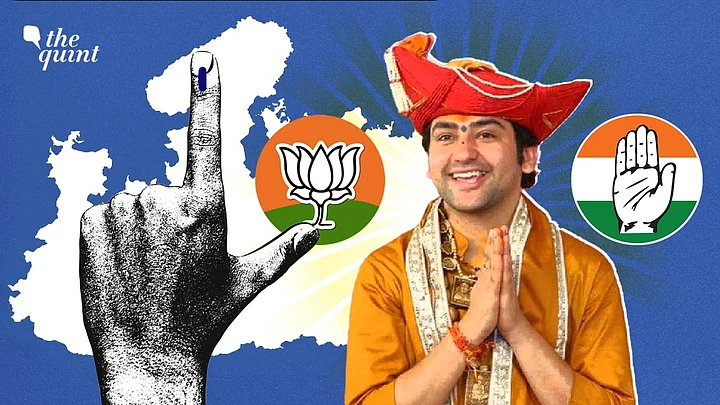(This article has been reposted in light of Congress senior leader and former chief minister of Madhya Pradesh, Kamal Nath, playing host to Dhirendra Shastri in his turf Chhindwara from 5-7 August.)
As the Madhya Pradesh Assembly election approaches, the state's political landscape is witnessing a new horizon – the growing influence of self-proclaimed godman and prominent Hindutva figure Dhirendra Krishna Shastri.
With both the Bharatiya Janata Party (BJP) and Congress taking notice, Shastri's influence has become a significant factor in the electoral calculations of the parties.
The Man and His Message
Dhirendra Krishna Shastri popularly known as Bageshwar Dham Sarkar is a religious preacher and the head of the Bageshwar Dham Ashram in the Chhatarpur district of MP.
He has a significant following in MP and slowly across other parts of the country where his rallies have been drawing large crowds. Shastri's message is centred around encouraging Hindutva and the Hindu way of living. His speeches are replete with references to Hindu scriptures and teachings, and he advocates for a return to a more traditional and conservative way of life.
Both the Congress and BJP have turned MP into an experimental ground for Hindutva politics as both parties are prioritising this agenda over other vital developmental issues. As a result, even religious figures are trying to gauge the potential impact of the current political climate on their interests.
New Hindutva Proponent Gaining Ground in MP
The BJP has been in power in MP for more than 15 years, and it has promoted a Hindutva agenda through its policies and programmes. The influence of Hindutva on the electoral fortunes of political parties is well-known, and the BJP has been successful in using it to its advantage.
The Congress party resorted to a soft Hindutva strategy using tactics such as installing 108 Hanuman idols in former chief minister and senior leader Kamal Nath's family stronghold of Chhindwara before the November 2018 Assembly election.
After securing a victory in the election, the Kamal Nath government wasted no time setting up the Adhyatma department which seems to be nothing more than a thinly-veiled attempt to push spiritual propaganda.
Shastri is the founder of the Bajrang Sena, a right-wing group that has been involved in several controversial incidents in the Chhatarpur district of MP where he is based. He has been accused of making hate speeches and inciting violence and has been involved in clashes with the police and other groups.
Shastri's influence in MP is growing, and it is becoming a significant factor in the state's electoral politics. He has a considerable following in his home district of Chhatarpur where the BJP won one seat and the Congress three seats in the 2018 Assembly elections.
He has been seen with many senior leaders from both parties, including Kamal Nath. While Shastri may have the most influence in his home district, his rallies are drawing crowds from across the state, making him a significant player in the upcoming elections.
Media Promotion of Shastri's Ideology Raises Concerns
It is concerning to see the media actively promoting individuals like Shastri who espouse questionable and controversial views. The media's extensive coverage of Shastri's rallies and speeches as well as his appearances on television programs raises concerns about the kind of messaging and ideologies being promoted by the self-proclaimed godmen and babas.
While the media has a duty to report on events and individuals of public interest, they must also consider the potential consequences of amplifying certain voices and views.
In the past, other spiritual leaders such as Asaram Bapu, Baba Ramdev, and Sadhguru Jaggi Vasudev have also played a significant role in shaping the political landscape. They have been able to amass a considerable following due to their spiritual teachings which resonate with many in the country.
In some cases, their influence has been so strong that political parties have sought their endorsement or formed alliances with them to secure votes. However, their involvement in politics has not been without controversy, and some have faced criticism for their views on sensitive issues such as caste, religion, and gender.
Overall, the influence of self-proclaimed godmen and babas on Indian politics is a complex and contested issue. While they can mobilise a significant base of support, their involvement in politics raises questions about the separation of religion and state and the role of spiritual leaders in the public sphere.
Can 'God's Messengers' Govern States?
As MP heads to the polls, the influence of Hindutva and its various political implications will be keenly watched. The outcome of the elections will shape the future of politics in the state and beyond.
While the rise of Dhirendra Krishna Shastri is a new phenomenon, the influence of self-proclaimed godmen and babas in Indian politics is not. The impact of such figures on Indian democracy and society is complex and multifaceted, and it is a matter that requires careful consideration.
It remains to be seen how much of an impact Shastri will have.
(Amrit Pandey is a political researcher and student of data, culture and society at the University of Westminster. This is an opinion piece. The views expressed above are the author’s own. The Quint neither endorses nor is responsible for them.)
(At The Quint, we question everything. Play an active role in shaping our journalism by becoming a member today.)
